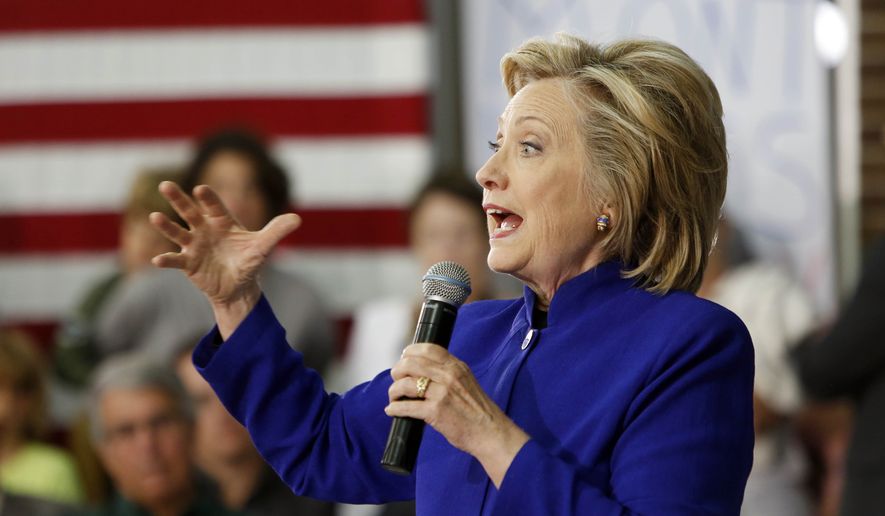Former Secretary of State Hillary Rodham Clinton’s emails contained “top secret” material, the government’s top spy watchdog said Tuesday, revealing that the messages were even more sensitive than previously disclosed.
I. Charles McCullough III, the inspector general for the intelligence community, said he has concluded two of Mrs. Clinton’s emails met the standard of “top secret/SCI level,” while other messages are still being scrutinized to see how secret they should have been.
Sen. Charles E. Grassley, chairman of the Senate Judiciary Committee, released Mr. McCullough’s summary of his findings, though not the messages with the classified information.
He has called on the FBI to get a handle on what information Mrs. Clinton had on her private server — information that is now also on a flash drive being held by her personal attorney.
“This information revealed by the inspector general makes it even more important that the FBI and the State Department secure these documents,” Mr. Grassley said. “To date, the two agencies most critical to securing this information have failed to assure the American people that they are taking the necessary steps to protect America’s national security interests.”
The new information comes as the State Department inspector general revealed his investigation has expanded to include whether Mrs. Clinton’s top aides also used private accounts, shielding information from open-records searches and the public.
SEE ALSO: Hillary Clinton to turn over private email server to federal investigators
Mrs. Clinton initially said she never trafficked in classified information from her email account, which she issued to herself and maintained on a server she kept at her home in New York, rather than using a state department address and regular government servers. But more recently, Mrs. Clinton has said she didn’t email information marked classified at the time.
The inspector general said the information, while not specifically marked classified, was secret and should not have been handled on an email system without security.
“In response to the above references congressional notification, my office received multiple congressional requests for copies of former Secretary Clinton’s emails containing classified intelligence community (IC) information. These emails, attached hereto, have been properly marked by IC classification officials, and include information classified up to “TOP SECRET//SI/TK//NOFORN,” Mr. McCullough said in his memo to Congress.
Top secret information is deemed to be so sensitive that its release could cause major damage to national security. NOFORN is a designation saying the information is not to be shared with foreign nationals. The other designations denote the type of information contained.
The classified information in Mrs. Clinton’s emails has become a nightmare for the Obama administration, which is under a court order to release her messages, but is struggling to review them and strip out the secret information first — while also keeping to the judge’s schedule.
The State Department missed its July deadline by more than 1,700 pages, and blamed the secret information for the problem.
Trying to get a handle on the situation, the State Department now says it is sharing questionable emails with five different intelligence agencies, giving them a chance to weigh in on what kinds of things should be withheld.
John F. Hackett, the State Department’s top open-records official, told the federal court late last week that they have added the extra step at the behest of Mr. McCullough.
The revelations pose a political problem for Mrs. Clinton, who had said her email arrangement was secure.
Denver media reported Tuesday that the FBI last week visited the Colorado company that helped set up the server Mrs. Clinton used. The news reports said the FBI is not conducting a formal investigation, but is gathering information — including trying to figure out if the company, Platte River Networks, might have backup tapes with the emails.
Mrs. Clinton’s personal lawyer, David E. Kendall, does have a flash drive with the information, which is stored at his office.
The State Department has said its people have visited Mr. Kendall’s office and have determined the flash drive is kept in a secure manner.
• Stephen Dinan can be reached at sdinan@washingtontimes.com.




Please read our comment policy before commenting.